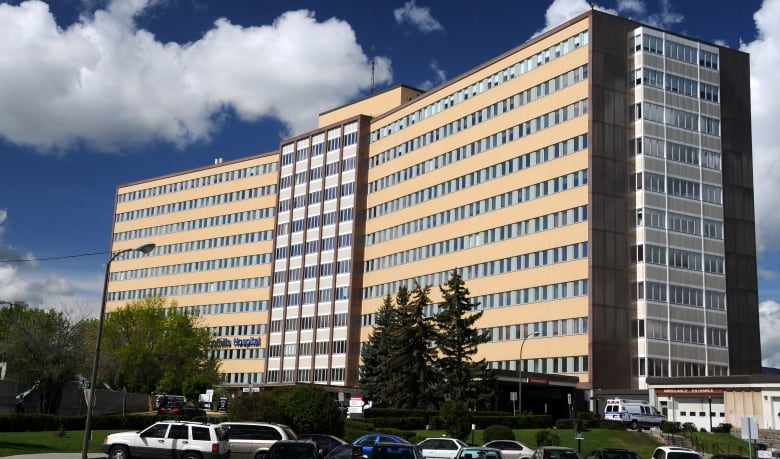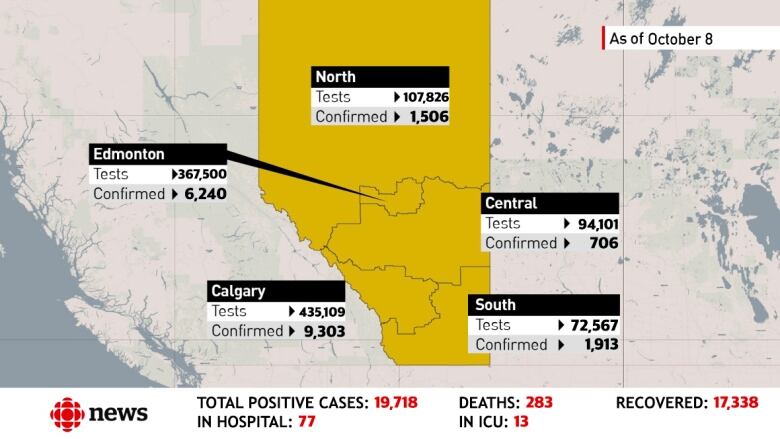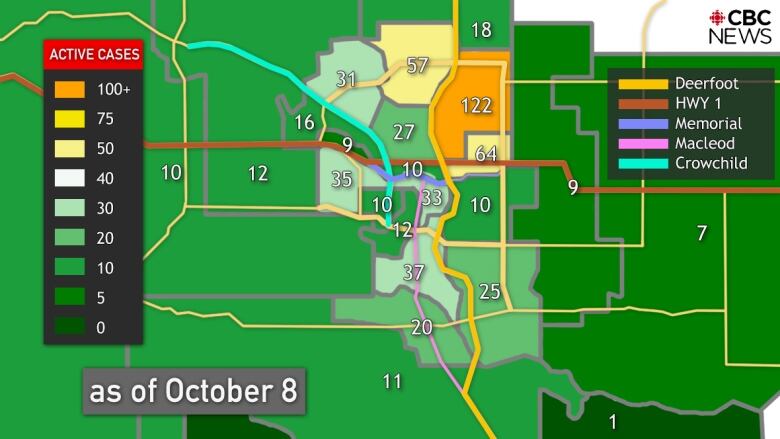What you need to know about COVID-19 in Alberta on Tuesday, Oct. 6
As Alberta's total active COVID-19 cases climb, province warns it may have to crack down in Edmonton

The latest:
- Another 276 new COVID-19 cases were reported on Tuesday in Alberta, the highest since the peak of the pandemic in April. That brings the province to a total of 1,900 active cases, up 117 from the previous day.
- Another person, a woman in her 70s in the Calgary zone, has died.
- The Edmonton zone hit its highest number of active cases, reporting 1,063 on Tuesday, up from 982 on Monday.
- Dr. Deena Hinshaw, Alberta's chief medical officer of health,warned Monday that the surging number ofcases in Edmonton could lead the province to impose additional measures in that city.
- In the biggest activeoutbreak in Alberta,at Foothills Medical Centre in Calgary,eight people have died and 80 people have tested positive for COVID-19. A total of 311 health-care workers have had to isolate at some point during the outbreak.

- There are now 319 cases at 149 schools of the more than 2,400 schools across the province. A total of 66schools are classified as outbreaks, which means two or more cases,and 14are on the watch list, which means five or more cases where the disease may have been acquired or transmitted within the school.
- One Calgary school,Ecolede la Rose sauvage,will move all students online after fourcases of COVID-19 were confirmed by AHS.
- Flu vaccines will be available starting Oct. 19, and the province is encouraging everyone who can to get immunized.
- An outbreak has been declaredat the Calgary Remand Centre with five cases of COVID-19 confirmed.
- Quebec has joined the COVID Alert app, leaving B.C. and Alberta as the only remaining provinces with no immediate plans to activate the digital tool.
What you need to know today in Alberta:
Hinshaw said Monday thatone of the factors leading to the climbing numbers in Edmontonis thatsome people 11 per cent of active casesare attending work or social gatherings while symptomatic and awaiting test results.
"I want to be clear. If you are sick, you need to stay home," she said.
She askedpeople Thanksgiving dinners to be mindful and continue to take precautions, lest the celebratory time take a dangerous turn.
"This is not a normal Thanksgiving. I urge you to keep your gatherings limited only to your household and cohort members, no more. I ask that you keep gatherings as small as possible, eat outdoors if possible and don't share serving spoons or dishes," she said.
"If you are even slightly sick, don't go to a Thanksgiving event and don't host one at your home. The greatest tragedy would be for Thanksgiving dinner to turn into an opportunity for COVID to spread to our loved ones, potentially with severe consequences. Let's celebrate all that we are thankful for by protecting each other, not taking chances."
A total of 61people are in hospital, and 13are in intensive care. Labs have now performed1,442,603tests on 1,078,066 Albertans.
Here's the regional breakdown of active cases reported on Tuesday:
- Edmonton zone: 1,063, up by 81 from Monday.
- Calgary zone: 645, up 21.
- North zone: 99, down 6.
- South zone: 61, up 14.
- Central zone: 26, up 4.
- Unknown: 6, up 3.

Ottawa has signed agreements with Alberta, Ontario and Quebec to supply federal bureaucrats to help those provinces with their contact tracing the process of connecting with people who may have been in close contact with a positive case of the novel coronavirus.
Parents of students attending Catholic schools in Edmonton are being told they can choose only one learning option for the rest of the current school year online or in-person.

An earlier plan gave families four opportunities within the year to select their preferred learning option.But the Edmonton Catholic School District is facing a strain on resources, including the availability of teachers, and needs to adjust its plans, it said in a news release Monday.
Alberta's chief medical officer of health says the province won't be cancelling Halloween over COVID-19 fears.
The province has releaseda series of guidelines on its websiteabouthow both trick-or-treaters and candy handers can enjoy the night safely.
Find out which neighbourhoods or communities have the most cases, how hard people of different ages have been hit, the ages of people in hospital, how Alberta compares to other provinces and more in: Here are the latest COVID-19 statistics for Alberta and what they mean
What you need to know today in Canada:
As of 8:15a.m. ET on Tuesday, Canada had 168,962confirmed or presumptive coronavirus cases. Provinces and territories listed 142,334of those as recovered or resolved. A CBC News tally of deaths based on provincial reports, regional health information and CBC's reporting stood at 9,504.
Contact tracing efforts are being ramped up in an effort to curbsurging transmission rates in some of Canada's COVID-19 hot spots, withPrime Minister Justin Trudeau promisingmore federal support and Quebec becoming the latest province tojointhe COVID Alert app.
Trudeausaid Monday that the government has signed agreements with Alberta, Ontario and Quebec to provide federal employeesto help with contract tracing in coronavirus hot spots.
Contact tracers advise those who may have been exposed to COVID-19 to self-isolate or get tested to mitigate the spread of the virus. Delays in reaching out to them can interfere with the efficacy of contact tracing.
Some Americans continue to defy the rules by making side tripswhen driving through Canada to or from Alaska, despite tough measures introduced in July to put a stop to it.
In August, B.C. RCMP ticketed a half-dozen Americans in two separate incidents for going off-route during their treks. The tickets totalled $4,500 in fines and, in one case, RCMP escorted afamily of five out of Canada.
Canadianscan now apply through the Canada Revenue Agency (CRA) fora new sick leave benefit and anew caregiver benefit for those forced to take time off work to care for a dependent because of the pandemic.
The benefits comeafter legislation creating them was rushed through the House of Commons last week. Bill C-4 replacedthe now-defunct $500-per-week Canada emergency response benefit (CERB), which came to an endafter helping almost nine million Canadians weather the impact of the pandemic.
High school students in Quebec's red zones willbe required to wear masks in the classroom, organized sports will be prohibitedand gyms closed under new restrictions aimed at containing the spread of the coronavirus.
The new rules, announced Monday, go into effect Oct. 8 until at least Oct. 28. Education MinisterJean-Franois Roberge said students in Grade 10 and 11 will pivot to a hybrid form of schooling, where they will be physically in school only one out of every two days to reduce class sizes.
Canadians have made more than 830,000 repayments ofCOVID-19 emergency aid benefits to whichthey were notentitleda statistic some say reflects mass confusion over fast-tracked federal programs.
The figures provided to CBC News by the Canada Revenue Agencyinclude repayments from recipients of the Canada emergency response benefit (CERB) and Canada emergency student benefit (CESB)
Self-assessment and supports:
Alberta Health Services has an online self-assessment tool that you can use to determine if you have symptoms of COVID-19, but testing is open to anyone, even without symptoms.
The province says Albertans who have returned to Canada from other countries must self-isolate. Unless your situation is critical and requires a call to 911, Albertans are advised to call Health Link at 811 before visiting a physician, hospital or other health-care facility.
If you have symptoms, even mild, you are to self-isolate for at least 10 days from the onset of symptoms, until the symptoms have disappeared.
You can find Alberta Health Services' latest coronavirus updates here.
The province also operates a confidential mental health support line at 1-877-303-2642 and addiction help line at 1-866-332-2322, both available 24 hours a day.
Online resources are available for advice on handling stressful situations and ways to talk with children.
There is a 24-hour family violence information line at 310-1818 to get anonymous help in more than 170 languages, and Alberta's One Line for Sexual Violence is available at 1-866-403-8000, from 9 a.m. to 9 p.m.












_(720p).jpg)


 OFFICIAL HD MUSIC VIDEO.jpg)
.jpg)



























































































